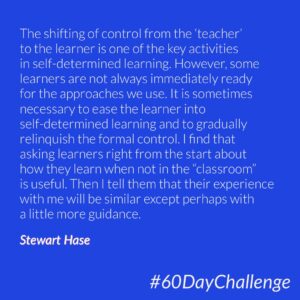 Back in post #15 on redefining the role of teacher, group member Rachel Girman shared this article on heutagogy… The Definition of Heutagogy and Self-Determined Learning.
Back in post #15 on redefining the role of teacher, group member Rachel Girman shared this article on heutagogy… The Definition of Heutagogy and Self-Determined Learning.
Hoo-ta-what?
Down the rabbit hole…..! 🐇🐇
I’ve heard the word previously, but can’t say I was all that familiar with it. AND it seems relevant to our work of transforming schooling to be more human-centered.
So first, let’s distinguish it….
Pedagogy – Teacher agency reigns supreme; teacher controls what is learned and how it is learned.
Andragogy – (Ha! Bet you didn’t even know such a word existed!) – Often associated with adult learning, agency is a give and take between the teacher and the learner; the teacher sets the tasks while learners aim to find their own solution with the teacher acting as the “guide on the side.”
Heutagogy – Here we have the greatest level of learner agency, and this is often referred to as self-determined learning. Learners find their own problems and questions to answer; the learner (rather than the curriculum or the teacher) is at the center of the learning process with learner-determined goals, paths, processes and products.
Whew…..Sounds a bit like graduate school…. Or real-world, informal learning.
OK…you’re intrigued, right?
How might one go about designing self-determined learning? (That may sound contradictory, but there is a role for teachers!)
In Experiences in Self-Determined Learning (2014), Stewart Hase suggests:
The learner is at the center of the process and is a partner. Clearly there is a curriculum or program outline, depending on the type of learning experience, to start the process. It is not an Open Space approach although in some circumstances this might be appropriate such as in corporate training workshops. However, at the first interaction between learner and learning leader, everything is open to negotiation and the balance of control shifts. (pg. 24)
OK…you’re still intrigued..especially by the phrase learning leader.
What else needs to be considered?
In Heutagogy and Lifelong Learning: A Review of Heutagogical Practice and Self-Determined Learning, Lisa Marie Blaschke suggests four design considerations to support heutagogical learning:
- Learner-defined learning contracts – Defining what will be learned, how it will be learned, and how/what will be assessed.
- Flexible curriculum – Learners create the learning map, and teachers serve as the guide based on the learners questions.
- Learner-directed questions – What are the questions learners have about their world? What are they curious about? What challenges need to be solved?
- Flexible and negotiated assessment – How well have the competencies been achieved? What tools (such as rubrics) will be used, and how will they be negotiated between the teacher and learner?
While it would seem (in my limited research, admittedly) that heutagogy is utilized mostly at the post-secondary level, I can see how it could prove beneficial for learners at the secondary level ready to take greater ownership of learning.
I would also like to think that it’s neither an all or nothing. Such a learning experience design might just provide variety as well as independence in learning for those ready to take on the challenge. Isn’t this what many of our kids were doing…at home…during the pandemic and disruption of schooling?
Much more to learn…thanks for sharing Rachel! And now on to the provocations…=
—–
❓ Provocations:
What would be the WHY behind embracing such learning design for learners ready to shed the over-structuring of the current “pedagogy” model? How do the roles of teacher and learner transform in such a model? What structures and mindsets need to be changed? And finally, might heutagogy make schooling more human-centered? Under what conditions?
💎 Resources:
Experiences in Self-Determined Learning (2014) by Stewart Hase
🧠 Mindsets:
Agency
💡 Area:
Learning
📣 Drop your thoughts in the comments, or in the Facebook group, and feel free to share resources. 🔥🔥🔥
- A silver lining - January 22, 2022
- Is our use of tech working against us? 🤔 - September 8, 2021
- What’s NOT going to change in the next 10 years? 🤔 - September 7, 2021